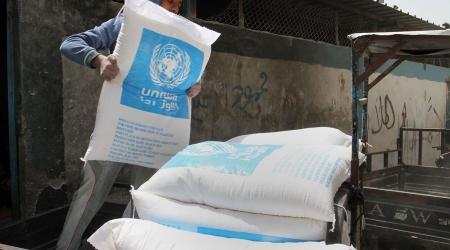United States Consul-General to Jerusalem Donald Blome announced on Thursday a contribution of $51.6 million from the United States to Palestinian refugees in the West Bank and Gaza.
According to Yumna Patel, reporting for Ma’an News Agency, the donation was a response to the United Nations Relief and Work Agency for Palestine Refugees in the Near East’s (UNRWA) 2016 Emergency Appeal for the occupied Palestinian territory, at a “critical” time when representatives said refugees were in dire need of assistance.
UNRWA is currently seeking $403 million in emergency funds, which it said it needed to meet the “minimum humanitarian needs” of Palestinian refugees living in the occupied West Bank and besieged Gaza Strip.
Blome and UNRWA Deputy Commissioner-General Sandra Mitchell made the joint announcement during a ceremony at an UNRWA school in the al-Duheisha refugee camp near Bethlehem.
The funds will be distributed among a variety of programs, which include community mental health, food assistance, emergency health clinics, and a new “e-card” program.
Both Blome and Mitchell stressed the importance of the ‘e-card’ program, praising the “innovative nature” of the new system, which places a certain amount of money on a debit style-card, with which the cardholder can go shopping at affiliated grocery stores.
Blome hailed the e-card as multi-purpose solutions that could mitigate a series of problems, from giving refugees freedom of choice when it comes to shopping for food — whereas refugees previously received fixed food parcels — to making life easier for elderly refugees who previously had to wait in long lines for often heavy food parcels.
Instead of the $111 per year that had been provided to refugees in the form of a food basket, UNRWA’s new program will provide $130 per year via cash card, in four cycles annually, to some 36,129 people, according to the UN agency.
UNRWA decided to halt its food distribution program in West Bank refugee camps and replaced it with the cash card system in April, causing concern among UNRWA’s Palestinian employees, who said the move jeopardized the jobs of 300 to 400 people who work at the organization’s distribution centers.
Close to 775,000 Palestinians are registered as refugees to the UN in the occupied West Bank. UNRWA provides services in 19 camps in the Palestinian territory.
Mitchell told Ma’an on Thursday that no one who worked in UNRWA food distribution lost, or would lose, their job as a result of the e-card program, and that UNRWA had reserved open positions in other sectors for former food distribution workers.
Blome emphasized the fact that despite the continued monetary support of the United States for Palestinian refugees, “humanitarian funds cannot take the place of political action.”
International attention and involvement in the politics of Israel and the Palestinian territories have been brought to the forefront again in recent months, as many world leaders have come out in support of a French-led multilateral peace initiative.
The United States has yet to make an official statement coming out in full support of the French initiative — which has been backed by the Palestinian Authority as well as 28 EU foreign ministers — or the proposed bilateral Arab initiatives — put in motion by Egypt and backed by Israeli Prime Minister Benjamin Netanyahu.
After the press conference at al-Duheisha on Thursday morning, the spokesperson for the US Consulate General expressed the United States’ commitment to exploring all options for a viable peace initiative, though he added that the US viewed a “unilateral initiative” as “difficult,” and would prefer to have both Israeli and Palestinian parties to sit down at the table together in order to come up with a solution to the conflict.
UN Secretary General Ban Ki-moon expressed a sense of urgency regarding peace talks in press conferences with Palestinian President Mahmoud Abbas and Netanyahu on Tuesday, highlighting that as Palestinians were “faced with growing indignities and a humiliating occupation that will soon enter its 50th year, many are losing sight of the prospect of an independent Palestinian state.”
Ban implored Netanyahu to recognize the occupation as the root of the cycle of violence, and expressed Israel’s need for “a leadership that is committed to peace and a just and lasting solution.”
All past efforts towards peace negotiations have failed to end the decades-long Israeli military occupation or bring Palestinians closer to an independent contiguous state.
The most recent spate of negotiations led by the US collapsed in April 2014.
Israel claimed the process failed because the Palestinians refused to accept a US framework document outlining the way forward, while Palestinians pointed to Israel’s ongoing settlement building and the government’s refusal to release veteran prisoners.
A growing number of Palestinian activists have criticized the two-state solution as unsustainable and unlikely to bring durable peace, proposing instead a binational state with equal rights for Israelis and Palestinians.
The binational state — termed the “one-state solution” — has increasingly gained support among Palestinians, activist groups, and intellectuals purporting it as the most reasonable way of upholding Palestinian human rights and their internationally recognized right to return to lands they were expelled from during and after the establishment of Israel in 1948.
Search IMEMC: “UNRWA”

